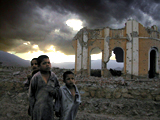India in Afghanistan: The 'Soft Power' Question
By Harsh V Pant for ISN
In the second such strike in as many years, a suicide car-bombing outside the Indian Embassy in the Afghan capital Kabul left at least 17 dead, none of them embassy staff, and scores of others wounded.
The incident was similar to the 7 July 2008 blast that struck the embassy, leaving 60 dead including an Indian foreign service officer and an embassy defense attaché. Investigators at the time believe the attack was perpetrated by the Pakistani-based Haqqani group, and suggested that Pakistani intelligence had also played a role.
The same story is being circulated this time around, with the Afghan envoy to the US suggesting Pakistani intelligence involvement. This is the first time that a top Afghan official has blamed the Pakistani intelligence agency (ISI) for a terrorist attack. This development, as far as India is concerned, lends credence to theories that those who would like to rid Afghanistan of Indian involvement are upping the ante in an attempt to rupture burgeoning India-Afghanistan relations.
Indeed, ordinary Afghans appear to have welcomed Indian involvement in development projects in their country. It was only earlier this month that a 202-kilometer-long transmission line was completed to deliver electricity to Kabul with India’s help. India is building roads, proving medical facilities and helping with educational programs in an effort to develop and enhance long-term local Afghan capabilities. Toward this end, it has been India’s deliberate policy to refrain from giving its support a military dimension and to stick to civilian matters.
Western observers, on the other hand, have tended to view Indian involvement in Afghanistan as problematic, as it has worked to undercut Pakistan’s own influence in the country. The result is that India’s attempt to leverage its ‘soft power’ in Afghanistan is becoming increasingly risky.
India will have a tough road ahead as the perception gains ground that the Taliban are on the rebound with a heightened sense of political uncertainty in Washington as the Obama administration vacillates in accepting the advice of its military commanders to put more troops on the ground.
So far, there is a general consensus in India that it should not send troops to Afghanistan. Yet beyond this there is little agreement about what policy options it has if greater turbulence in the Af-Pak region spills over into India. The traditional Indian stance is while it is happy to help the Afghan government in its reconstruction efforts, it will not be directly engaged in security operations, but this is increasingly becoming harder to sustain. A debate therefore is emerging as to whether India should start supporting its humanitarian endeavors in Afghanistan with a stronger military presence.
If Afghanistan is the most important frontier in combating terrorism targeted against India, then how long can India continue with its present policy trajectory whereby its civilians are getting killed in pursuit of its developmental objectives?
India has much to consider. The return of the Taliban to Afghanistan would pose a major threat to its borders. In the end, the brunt of escalating terrorism will be borne by India, which already has been described as ‘the sponge that protects’ the West. Indian strategists warn that a hurried US withdrawal with the Taliban still posing a threat to Afghanistan will have serious implications for India, not the least of which would be to see Pakistan, its eternal rival, step in more aggressively.
To be fair, India’s role in Afghanistan should not be viewed through the eyes of western observers who have dubbed it provocative, or in the eyes of Pakistan, which resents its own waning influence. Rather, India’s involvement should be considered through the eyes of the Afghan people who, arguably, are benefitting from the use of its neighbor’s ‘soft power,’ whatever its end motivations.
While the debate over how to approach Afghanistan is not close to a resolution in Indian political corridors, any change in strategy will have serious implications for the future of India’s rise as global power and regional security in South Asia. And more often than not, India is forgotten in western media analysis of the situation in Afghanistan, which largely focuses on the west and Pakistan. Should it relinquish its ‘soft power’ strategy and replace it with something more forceful, that may change.

